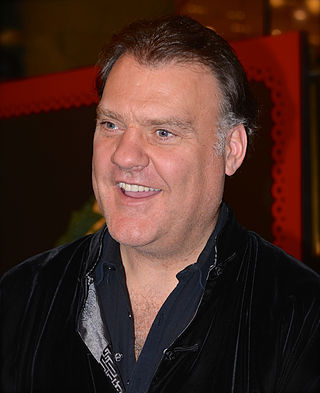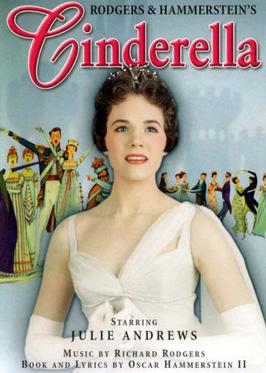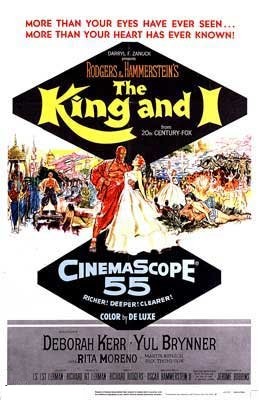Related Research Articles

The King and I is the fifth musical by the team of Rodgers and Hammerstein. It is based on Margaret Landon's novel Anna and the King of Siam (1944), which is in turn derived from the memoirs of Anna Leonowens, governess to the children of King Mongkut of Siam in the early 1860s. The musical's plot relates the experiences of Anna, a British schoolteacher who is hired as part of the King's drive to modernize his country. The relationship between the King and Anna is marked by conflict through much of the piece, as well as by a love to which neither can admit. The musical premiered on March 29, 1951, at Broadway's St. James Theatre. It ran for nearly three years, making it the fourth-longest-running Broadway musical in history at the time, and has had many tours and revivals.

Rodgers and Hammerstein was a theater-writing team of composer Richard Rodgers (1902–1979) and lyricist-dramatist Oscar Hammerstein II (1895–1960), who together created a series of innovative and influential American musicals. Their musical theater writing partnership has been called the greatest of the 20th century.

Sir Bryn Terfel Jones,, is a Welsh bass-baritone opera and concert singer. Terfel was initially primarily associated with the roles of Mozart, particularly Figaro, Leporello and Don Giovanni, and has subsequently shifted his attention to heavier roles, especially those by Puccini and Wagner.

Rodgers and Hammerstein's Cinderella is a musical written for television, but later played on stage, with music by Richard Rodgers and a book and lyrics by Oscar Hammerstein II. It is based upon the fairy tale Cinderella, particularly the French version Cendrillon, ou la petite pantoufle de verre, by Charles Perrault. The story concerns a young woman forced into a life of servitude by her cruel stepmother and self-centered stepsisters, who dreams of a better life. With the help of her fairy godmother, Cinderella is transformed into a princess and finds her prince.
"There's No Business Like Show Business" is an Irving Berlin song, written for the 1946 musical Annie Get Your Gun and orchestrated by Ted Royal. The song, a slightly tongue-in-cheek salute to the glamour and excitement of a life in show business, is sung in the musical by members of Buffalo Bill's Wild West Show in an attempt to persuade Annie Oakley to join the production. It is reprised three times in the musical.
"Some Enchanted Evening" is a show tune from the 1949 Rodgers and Hammerstein musical South Pacific. It has been described as "the single biggest popular hit to come out of any Rodgers and Hammerstein show." Andrew Lloyd Webber describes it as the "greatest song ever written for a musical".
"So in Love" is a song by Cole Porter from his 1948 musical Kiss Me, Kate, which is based on Shakespeare's The Taming of the Shrew.
"On the Street Where You Live" is a song with music by Frederick Loewe and lyrics by Alan Jay Lerner from the 1956 Broadway musical My Fair Lady. It is sung in the musical by the character Freddy Eynsford-Hill, who was portrayed by John Michael King in the original production. In the 1964 film version, it was sung by Bill Shirley, dubbing for actor Jeremy Brett.
"Oh, What a Beautiful Mornin'" is the opening song from the musical Oklahoma!, which premiered on Broadway in 1943. It was written by composer Richard Rodgers and lyricist/librettist Oscar Hammerstein II. The leading male character in Oklahoma!, Curly McLain, sings the song at the beginning of the first scene of the musical. The refrain runs: "Oh, what a beautiful mornin'! / Oh, what a beautiful day! / I've got a beautiful feelin' / Ev'rythin's goin' my way." Curly's "brimming optimism is perfectly captured by Rodgers' ebullient music and Hammerstein's buoyant pastoral lyrics."
"I Have Dreamed" is a show tune from the 1951 Rodgers and Hammerstein musical, The King and I. In the original Broadway production it was sung by Doretta Morrow and Larry Douglas. It has since become a standard, with many artists recording the song.
"I Whistle a Happy Tune" is a show tune from the 1951 Rodgers and Hammerstein musical, The King and I. It is sung by the Governess Anna Leonowens to her son Louis after the curtain rises on Act One of the musical, to persuade him not to be afraid as they arrive in Siam to serve the King.

The King and I is a 1956 American musical film made by 20th Century-Fox, directed by Walter Lang and produced by Charles Brackett and Darryl F. Zanuck. The screenplay by Ernest Lehman is based on the 1951 Rodgers and Hammerstein musical The King and I, which is itself based on the 1944 novel Anna and the King of Siam by Margaret Landon. That novel in turn was based on memoirs written by Anna Leonowens, who became school teacher to the children of King Mongkut of Siam in the early 1860s. Leonowens' stories were autobiographical, although various elements of them have been called into question. The film stars Deborah Kerr and Yul Brynner.
"It Might as Well Be Spring" is a song from the 1945 film State Fair. which features the only original film score by the songwriting team of Richard Rodgers and Oscar Hammerstein II. "It Might as Well Be Spring" won the Academy Award for Best Original Song for that year.
"The Gypsy in My Soul" is a popular song written for the 50th anniversary of the University of Pennsylvania Mask and Wig show in 1937 by two Penn graduates, Clay Boland and Moe Jaffe. Boland wrote the music and Jaffe the lyrics. Although both men had long since graduated, it had become the practice at the time for professionals, rather than students, to compose songs for the show.
"Getting to Know You" is a show tune from the 1951 Rodgers and Hammerstein musical The King and I. It was first sung by Gertrude Lawrence in the original Broadway production and later by Marni Nixon who dubbed for Deborah Kerr in the 1956 film adaptation. In the show, Anna, a British schoolteacher who has been hired as a governess, sings the song as she strikes up a warm and affectionate relationship with the children and the wives of the King of Siam.
"Climb Ev'ry Mountain" is a show tune from the 1959 Rodgers and Hammerstein musical The Sound of Music. It is sung at the close of the first act and is sung again in the epilogue of the second act by the Mother Abbess. It is themed as an inspirational piece, to encourage people to take every step toward attaining their dreams.
"Soliloquy" is a 1945 song composed by Richard Rodgers, with lyrics by Oscar Hammerstein II, written for their 1945 musical Carousel, where it was introduced by John Raitt. Gordon MacRae performs the song in the 1956 film version.

Dorothy Sarnoff was an American operatic soprano, musical theatre actress, and self-help guru. She had an active performing career from the late 1930s through the 1950s, during which time she sang in several operas with the New York City Opera and created several roles on Broadway, most notably Lady Thiang in the original 1951 cast of Rodgers and Hammerstein’s The King and I.
"Younger than Springtime" is a show tune from the 1949 Rodgers and Hammerstein musical South Pacific. It has been widely recorded as a jazz standard.
"The Second Time Around" is a song with words by Sammy Cahn and music by Jimmy Van Heusen. It was introduced in the 1960 film High Time, sung by Bing Crosby with Henry Mancini conducting his orchestra, and was nominated for the Academy Award for Best Original Song. It lost out to "Never on Sunday".
References
- ↑ "Shirley Stops the Shows - Shirley Bassey". AllMusic . Retrieved 29 November 2018.
- ↑ "A Bing Crosby Discography". Bingmagazine.co.uk. Retrieved September 14, 2017.
- ↑ "Something Wonderful - Carmen McRae". AllMusic . Retrieved 29 November 2018.
- ↑ "Liza's Back - Liza Minnelli | Songs, Reviews, Credits | AllMusic". AllMusic . Retrieved 29 November 2018.
- ↑ Ruhlmann, William. "Bernadette Peters Loves Rodgers and Hammerstein". AllMusic . Retrieved 29 November 2018.
- ↑ "My Romance - Carly Simon". AllMusic . Retrieved 29 November 2018.
- ↑ Unterberger, Richie. "Broadway - Blues - Ballads". AllMusic . Retrieved 29 November 2018.
- ↑ "The Broadway Album". AllMusic . Retrieved 29 November 2018.